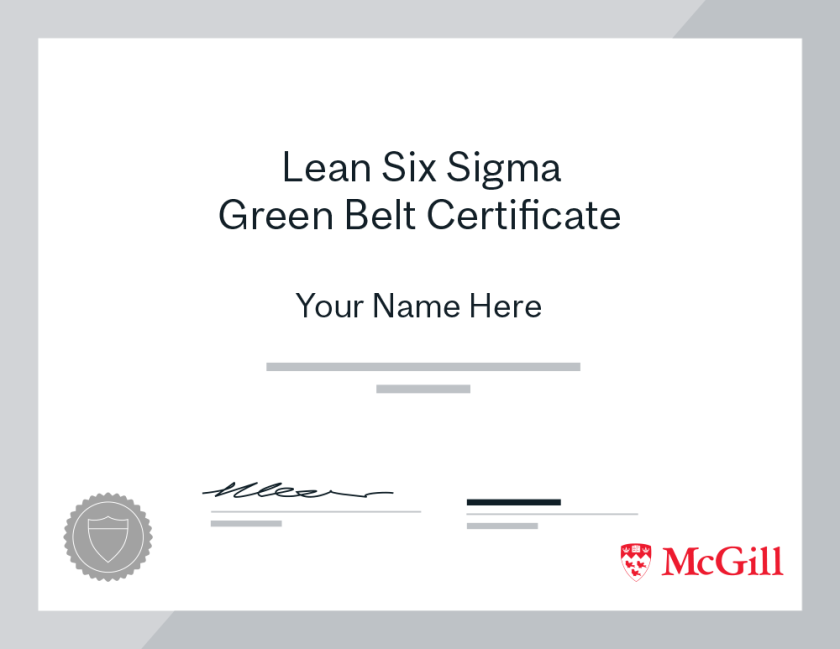Lean Six Sigma
The most successful continuous improvement methodology
Training and Certification at McGill University
Six Sigma has become the most successful continuous improvement and project management methodology for quality improvements. Focusing on customers’ needs, this approach utilizes data-driven tools, team-based decision-making, and a rigorous methodology to solve problems and ensure that the solutions are sustained over time.
We are proud to offer Lean Six Sigma training and certification programs to professionals from various industries and backgrounds.
Lean Six Sigma Green Belt — Including a Certificate in Building a Lean and Agile Organization (in English)
Training and certification (3 or 4 days)
Lean Six Sigma has become the most successful continuous improvement methodology and project management methodology for quality improvements. Obtaining a knowledge of the Lean Six Sigma methodology has become a prominent skill for professionals in any service or manufacturing company.
Choose from a 3-day training for a Lean Six Sigma Green Belt certification or a 4-day training for a Lean Six Sigma Green Belt and an additional certification in Building a Lean and Agile Organization from McGill University.
Upcoming Sessions
Lean Six Sigma Black Belt (in English)
Training and certification (9.5 days of training, 12 hours of coaching)
A Lean Six Sigma Black Belt is a trained improvement agent who demonstrates change management skills, project management skills, team leadership, and understands team dynamics. Certified Black Belts implement breakthrough improvements.
Learn to apply Six Sigma Black Belt principles in real-time, as you work through a project from definition to implementation. This training and certification program is an excellent next step for individuals who have completed Lean Six Sigma Green Belt training and certification.
Upcoming Sessions
Ceinture Verte Lean Six Sigma — Incluant un certificat en Développement d'une Organisation Lean et Agile (en français)
Formation et certification (3 ou 4 jours)
Cette formation est offerte en ligne et ainsi qu'en présentiel à Montréal en français.
Choisissez d'une formation de 3 jours pour une certification Lean Six Sigma Ceinture Verte ou une formation de 4 jours pour une certification Lean Six Sigma Ceinture Verte et un certificat en Construction d'une Organisation Lean et Agile de l'Université McGill.
Upcoming Sessions
Lean Six Sigma Green Belt for Healthcare (in English)
Training and certification (3 or 4 days)
This Lean Six Sigma training and certification program is tailored to professionals in the Healthcare field. Knowledge of the Lean Six Sigma methodology has become a prominent skill for professionals in Development, Manufacturing and Service companies, and is a rising trend in Healthcare.
Choose from a 3-day training to obtain a Healthcare Lean Six Sigma Green Belt certification, or a 4-day training to obtain a Healthcare Lean Six Sigma and Building a Lean and Agile Organization certification.
Upcoming Sessions

Taught by Experienced Industry Experts
Our Lean Six Sigma programs are led by experienced instructors, with extensive experience in helping a wide variety of organizations improve internal processes, implement project management practices, turnaround initiatives and continuous improvement deployments.
Alex Boussetta, lead instructor for our Lean Six Sigma programs, has trained, coached and certified over 1400 Green Belts and Lean experts, as well as 280 Black Belts and 21 Master Black Belts.
Industry-Recognized Certification
High certification standards are applied to ensure the highest level of knowledge, recognition, and credibility.
After completing the training and certification requirements for any of our Lean Six Sigma programs, you will receive a certificate, awarded by McGill University and the Council for Six Sigma Certification — an important distinction and impressive addition to your CV, LinkedIn profile, and more.


Accredited Training Providers
The Council for Six Sigma Certification is a professional accrediting body within the Six Sigma industry. The accredited training providers are rigorously reviewed to ensure that they meet an extensive checklist of compliance.

Meet McGill’s first Lean Six Sigma Black Belt: Kate Richardson
Kate Richardson, a senior manager and graduate of the McGill Lean Six Sigma Green Belt, felt that the Black Belt would be a key asset to her role and credits the program with deepening her understanding of data, its significance and how it can be used to solve problems.
Frequently Asked Questions
Who is Lean Six Sigma for?
The tools and concepts conveyed in Lean Six Sigma apply to professionals across industries. Training and certification is ideal for managers, directors, project managers, business analysts, process engineers, consultants, manufacturing engineers, warehouse, distribution, and logistics specialists. Many companies in the services, manufacturing and healthcare sectors recognize the competitive advantage of employees with a process improvement set of skills and mindset. These companies include Lean Six Sigma requirements in their senior and management job descriptions and related postings.
How will Lean Six Sigma benefit my organization?
You will be able to leverage Lean Six Sigma’s methodology and tools to drive efficiency improvements, reduce costs, enhance performance, introduce time efficiency, and increase customer satisfaction in your department or organization.
How will Lean Six Sigma enhance my career?
Lean Six Sigma certification—especially Black Belt certification—provides a competitive edge to those aiming for higher levels of management within an organization. Most professional roles, not only those related to continuous improvement, require skills related to Lean Six Sigma.
What is the difference between the Black Belt and the Green Belt?
A certified Greenbelt has learned the essential tools to manage improvement projects of medium complexity. A certified black belt is a change agent who possesses the improvement skills, team facilitation skills, and required change management skills to drive complex transformation within organizations.
Are there any prerequisite requirements to register?
Lean Six Sigma Green Belt
- At least two years of relevant full-time work experience (no internships)
Lean Six Sigma Green Belt for Healthcare
- At least two years of relevant full-time work experience in healthcare (no internships).
Lean Six Sigma Black Belt
- Lean Six Sigma Green Belt Certification from McGill University.
Other Green Belt certifications are welcome and will be assessed for content equivalence. - At least two years of full-time work experience (in any field)
What are the certification requirements for Lean Six Sigma?
In order to meet the certification requirements for our Lean Six Sigma Green Belt programs, you must attend and participate in all classes, and pass a final exam. For our Lean Six Sigma Black Belt program, in addition to attending classes, you must complete one project from definition to implementation, pass interim exams and two final exams (written and practical).
How long is a Lean Six Sigma certification valid?
Once earned, the certification never expires.

